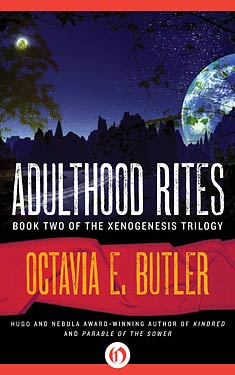Octavia
Butler
Completed 1/23/2019,
Reviewed 1/25/2019
4 stars
This is the
second book in the Xenogenesis series. It continues the questioning of colonialism,
slavery, powerlessness of women, and what it means to be human. It focuses much more on what the Oankali call
the Human Contradiction: that humans are
intelligent yet still perpetuate a hierarchical structure that is the cause of
strife, violence, and self-destruction.
It’s an excellent rumination on the topic through the eyes of a hybrid
male, part Oankali, part human, who tries to support the human race even though
he sees the examples of the contradiction all around him. There were parts that dragged, but overall, I
really enjoyed this book.
 Akin (pronounced
ah-KEEN) is the hybrid, or to use the terminology of the book, a
construct. He has five parents, a human
mother (Lilith from the first book) and father, an Oankali mother and father,
and an ooloi, the neuter gender of the Oankali.
He is the first male construct, and sort of an experiment to see if he will
have the same Human Contradiction because of his humanness. The humans who are cooperating with the
Oankali are on Earth in the Amazonian rainforest in trade villages living with
the aliens. The humans who are not
cooperating have run away and formed their own communities. These resisters were made sterile by the
Oankali to prevent them from creating a new self-destructive world. They can only bear children if they agree to
procreate with the Oankali. Resentful,
they resort to violence against the Oankali and the humans who live with
them. There are also raiders, resisters
who raid the villages stealing goods and children and selling them to the
humans who are sterile. Akin is one such
stolen baby.
Akin (pronounced
ah-KEEN) is the hybrid, or to use the terminology of the book, a
construct. He has five parents, a human
mother (Lilith from the first book) and father, an Oankali mother and father,
and an ooloi, the neuter gender of the Oankali.
He is the first male construct, and sort of an experiment to see if he will
have the same Human Contradiction because of his humanness. The humans who are cooperating with the
Oankali are on Earth in the Amazonian rainforest in trade villages living with
the aliens. The humans who are not
cooperating have run away and formed their own communities. These resisters were made sterile by the
Oankali to prevent them from creating a new self-destructive world. They can only bear children if they agree to
procreate with the Oankali. Resentful,
they resort to violence against the Oankali and the humans who live with
them. There are also raiders, resisters
who raid the villages stealing goods and children and selling them to the
humans who are sterile. Akin is one such
stolen baby.
The thing
that makes Akin so desirable, besides being the first male construct, is that
he looks fully human. He has no
tentacles except for an extremely long tongue with which he perceives the world
around him. He can also sting and kill with
it. He’s extremely intelligent, speaking
in complete sentences before normal babies would be speaking gibberish. After an initial search turns up negative,
the Oankali let him stay with the resisters because he has the unique advantage
to learn about them and empathize with them.
He is eventually rescued and pleads on behalf of the resisters to let
them have their own homeland and their reproductivity back.
As in the
first book, the plot and world building is quite complex. It amazes me that Butler had such a vivid
imagination, especially for the aliens and their culture. The point of view of the book is mostly Akin’s,
so we get a much richer sense of the morality of the Oankali. What we learn is that they are the ultimate
example of empathy. It is this empathy
that has made them decide to prevent humans from reckless reproduction and
self-destruction. But as Akin comes to
question, is it wrong to force change upon a people who are not willing to
change, even if the outcome seems tragically inevitable.
What also
struck me in this book was the complexity of the relationships. Butler spends a lot of time giving us
intimate looks at Akin’s relationships with his construct siblings, his ooloi
parent, as well as his other parents and his captors. All of his relationships are broken to some
extent. But being the first of his kind,
it all helps, or hinders, his ability to figure out who he is and what his
purpose is.
I give this
book four stars out of five. I had a
tough time coming to this conclusion because the parts that dragged made me
want to give it three stars. But the
book is so intelligently and beautifully written that I had to concede that it
was an excellent read.
No comments:
Post a Comment